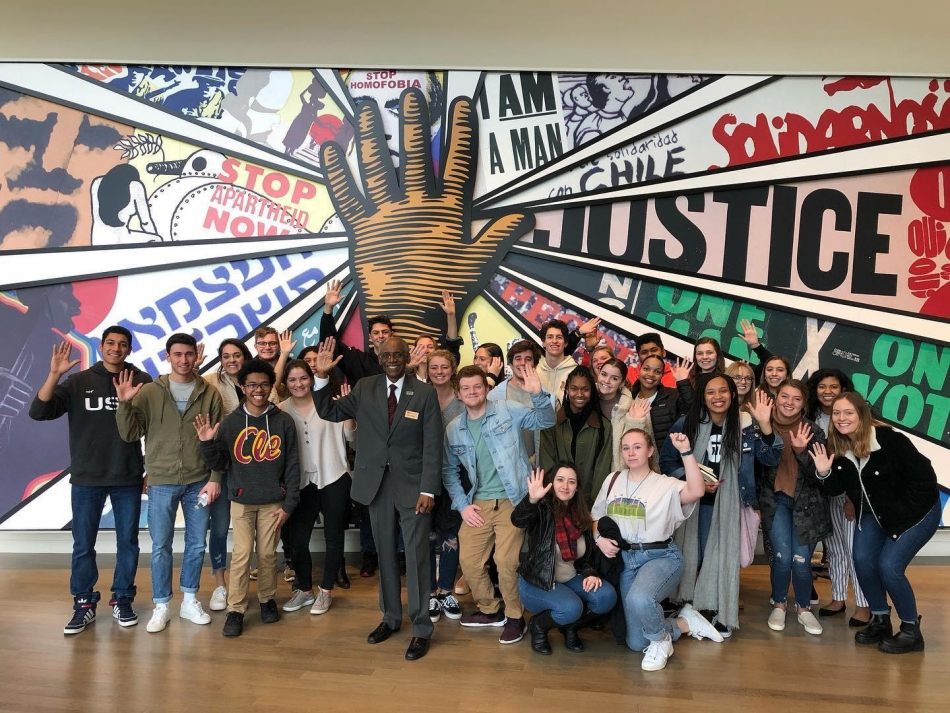Elon University’s Isabella Cannon Leadership Fellows program was selected for national recognition of its immersive course on the Civil Rights Movement.
Elon University’s Isabella Cannon Leadership Fellows program was recently selected as one of two 2020 Outstanding Leadership Program Spotlight of the Year Award recipients for their annual Civil Rights Leadership Tour. This honor is given by NASPA’s Student Leadership Programs Knowledge Community. The Outstanding Leadership Spotlight Program of the Year Award recognizes programs that are transforming higher education through best practices.

The Isabella Cannon Leadership Fellows is a four-year, cohorted program designed to help students build leadership competencies through a variety of programs and experiences. In their sophomore year, all Leadership Fellows take the course Disarming Injustice and participate in the Civil Rights Leadership Tour where they engage in deep learning about the civil rights movement.
Through this important social movement, the Leadership Fellows gained leadership lessons around ways diverse groups of activists used the tactic of direct, nonviolent action to challenge and ultimately bring an end to segregation in the United States. The course, taught by Lecturer in Human Service Studies Sandra Reid, is designed to inform participants about the past while inspiring activism for the future.
Fellows spent one week at Elon learning about the movement from their in-class text “Cradle of Freedom: Alabama and the Movement that Changed America” by Frye Gaillard. After their class experience, the cohort spent 10 days traveling and following important historical marks of the movement.
Their study of the civil rights movement is focused on leaders and events in five cities — Greensboro, Atlanta, Birmingham, Selma and Montgomery – that were at the very center of the movement during the 1950s and 1960s. After spending time studying these events, Leadership Fellows visited these cities to see firsthand where the movement took place. The group also explored the impact of the movement on these cities today, and were challenged to apply the lessons learned to the emerging movements of today.
The students visited various sites including Birmingham’s Civil Rights Institute and the Center for Civil and Human Rights in Atlanta. They also had an opportunity to meet with leaders during the tour including city mayors, Freedom Riders, members of historic Negro Southern League baseball teams, and current-day youth activists.
Ethan Gabriel, a sophomore Leadership Fellow, describes the feeling he got from leaders he met during site and museum visits. “Whenever they were speaking about tragedies and stories of triumph, they always had a tone of hope,” he says. “One thing you had to have during that time was hope, hope that things would get better and that what you’re fighting for was worth it.”
Additional tour sites included Historically Black Colleges and Universities to include Miles College, Morehouse College and Alabama State University, key higher education institutions where many of its students were involved in the civil rights movement. Fellows visited Sixteenth Street Baptist Church and Montgomery, Alabama’s most recent historic site, Equal Justice Initiative’s Legacy Museum and Peace & Justice Memorial.
Sophomore Leadership Fellow Sarah Myers elaborated on feelings that arose at the memorial.
“While walking through this memorial, I found 60 documented lynchings in Missouri, not too far from my hometown,” Myers said. “This memorial is the nation’s first memorial dedicated to the legacy of injustice, discrimination and oppression that black Americans face to this day, and what struck me is that the federal government has still yet to acknowledge the racism and harm that they have caused black Americans.”
One of the more profound experiences happened during their time in Selma, Alabama. Fellows were welcomed at Brown Chapel AME Church, site of the preparations for the march to Montgomery on March 7, 1965, a day that became known as Bloody Sunday. From Brown Chapel, Fellows walked to and across the Edmund Pettus Bridge, following the footsteps of history.
Gabriel said about the impact of physically being in spaces of history.
“It really all put it into perspective that this actually happened, and these aren’t just stories that we’re hearing over and over again,” Gabriel said. “This is living, physical proof that this all happened.”
The transformational trip broadened minds and knowledge, instilling the importance of young people’s power. The Civil Rights Leadership Tour encouraged Leadership Fellows to identify ways to disarm current day injustice and prejudice and create social change in the communities that they are a part of.
“It is essential to educate and learn about a problem before trying to create solutions for it,” Myers said. “By having the opportunity to go on this experiential learning journey through Alabama and Georgia, my Leadership Fellows cohort was able to generate some ideas for our Common Good Projects as a way to initiate change in the Elon Community.”
The fight is not over, and the movement continues with a newer generation of leaders continuing the march, armed with inspiration and strength of the past.
Visit the Center for Leadership’s website for more information about Disarming Injustice and the Isabella Cannon Leadership Fellows
** Take a look into the experience. Join the Center for Leadership’s Virtual Civil Rights Leadership Tour online! Set to release April 28th, the Elon community will have the opportunity to explore these ideas and places for themselves**


